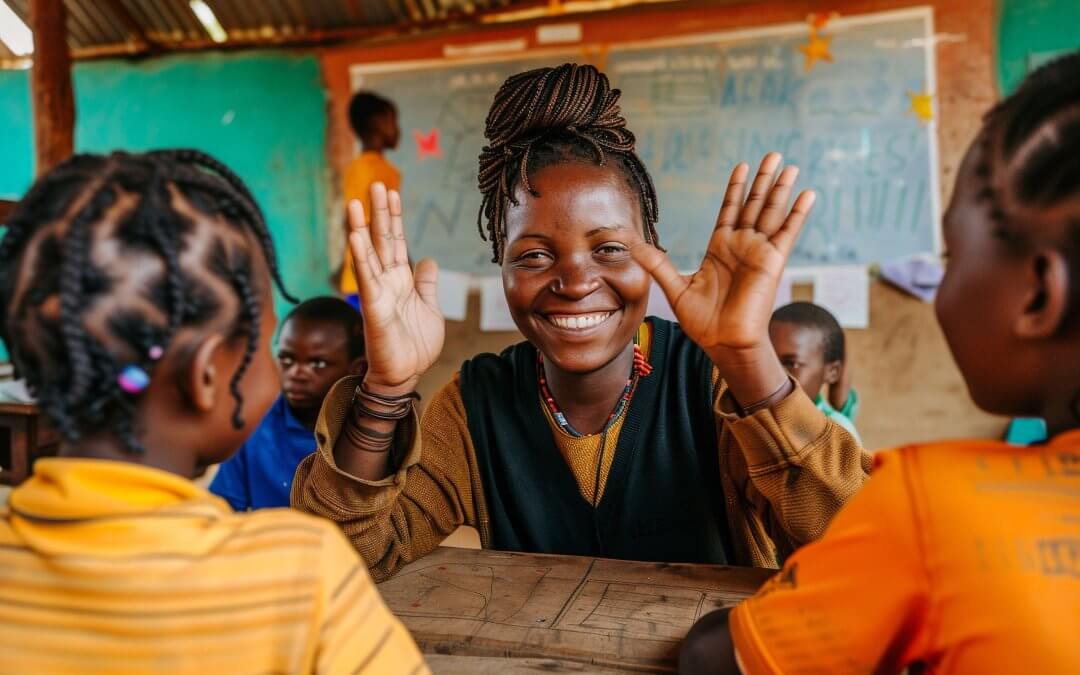Inclusive education is a major cornerstone of the global push for equity in learning, but translating commitments into classrooms remains complex. Over the past decade, Primson has evaluated inclusive education initiatives, projects and programmes across sub-Saharan Africa. These studies highlighted the barriers children faced before interventions began, as well as the progress and lessons that followed revealing both inspiring progress and recurring challenges. From these, critical lessons have been learnt that donors, programme designers, implementers, policy makers, inclusive education advocates and governments must consider if inclusive education is to truly transform lives within sub-Saharan Africa.
1. Access Alone Will Not Guarantee Learning
Baseline studies in Sudan and Rwanda revealed the depth of exclusion facing girls and children with disabilities: high dropout rates, repetition, poor foundational literacy and numeracy, and unsafe or inaccessible school environments. These findings underscored why interventions were needed in the first place.
Follow-up evaluations then showed progress such as remedial learning clubs in Rwanda improving attendance and engagement but also reminded us that access alone does not guarantee learning.
Lesson: Use baseline data to design interventions that directly tackle foundational barriers. Then track not just enrolment but learning outcomes over time.
2. Invest in Teacher Preparedness and Support
Across contexts and countries, teacher capacity emerged as a decisive factor. In Malawi and Sudan training in inclusive pedagogy was limited, leaving teachers ill-equipped to support learners with diverse needs. In Rwanda, gender-sensitive teaching improved after sustained mentorship, but many teachers still struggled with large classes and limited resources
Lesson: Continuous professional development, coaching, and exposure to inclusive practices must be embedded into national teacher training systems, not left as project add-ons or short term activities.
3. Inclusion Requires Infrastructure and Materials
Lack of disability-friendly infrastructure ramps, adapted toilets, accessible classrooms was a recurring barrier in Sudan, Zambia and Malawi. Sudan’s e-learning programme demonstrated innovation by providing digital learning kits, but many rural schools lacked reliable power or internet.
Lesson: Infrastructure and teaching materials are not “extras” but essentials. Governments must integrate inclusive design standards into school construction, planning and budgets, ensuring no child is excluded due to the built environment.
4. Community Engagement is a Game-Changer
Projects that invested in community mobilization saw better outcomes. Parent and community support groups in Rwanda encouraged girls’ re-entry after dropout. In Malawi, community structures helped monitor children with disabilities and link families with schools; In Zambia’s ECCDE programme, multi-sectoral community centres combined education, health, and nutrition.
Lesson: Community mobilization is not peripheral; it is central to sustaining inclusion and shifting norms. Mobilizing parents, local leaders, and community groups fosters accountability and ensures children are not left behind.
5. Policy Alignment Strengthens Sustainability
Evaluations revealed that projects embedded in government strategies had stronger prospects for sustainability. For instance, Malawi’s support to the Ministry of Education contributed to a National Inclusive Education Strategy. In contrast, interventions, projects or programmes that operated parallel to government systems struggled to last.
Lesson: Donors and NGOs should embed projects within government plans, strengthen ministries’ capacity, and avoid creating siloed interventions.
6. Inclusive Education Begins at Birth.
The IECCDE project demonstrated that early identification of disabilities, combined with caregiver training and ECCD centres, significantly improved children’s readiness for school. Waiting until primary school often meant missed opportunities for early support.
Lesson: Inclusive education begins at birth. Screening and caregiver support should be prioritized from the start. They are vital for long-term educational equity.
7. Monitor Equity, Not Just Averages
National averages often hide deep inequalities. In Sudan, girls from rural and displaced communities faced far higher dropout risks. In Rwanda, gender gaps in STEM persisted despite overall improvements.
Lesson: Monitoring must disaggregate data by gender, disability, geography, and socio-economic status. Equity-focused monitoring enables timely corrective action.
Conclusion: From Projects to Systems
The collective lesson across all our evaluations is clear: inclusive education cannot be achieved through fragmented projects. It demands systemic change from national teacher training curricula to infrastructure standards, from community mobilization to policy integration.
At Primson, we remain committed to working with governments, development partners, and communities to move from access to true inclusion, ensuring every child regardless of gender, disability, or circumstance.
Projects:
- Primson Management Services for UNICEF in 2021 Baseline Evaluation of the Girls’ Education Programme in Sudan
- Primson Management Services. Endline Evaluation of the Inclusive Education Project in Malawi (2019).
- Primson Management Services for Save the Children in 2021 End of Project Evaluation: Inclusive Early Childhood Care and Development Education (IECCDE), Zambia). https://idela-network.org/wp-content/uploads/2023/04/IDELA-Endline-Report_Save-the-Children-Zambia_2023.pdf
- Primson Management Services for Plan International in 2018 Mid-term Review of Projects under the NORAD Agreement (2016–2019) in Zambia. https://www.norad.no/contentassets/ae82d3bbf0a24a39b48c3e8aadf88dfe/mid-term-review-of-projects-under-the-norad-agreement-2016-2019-in-zambia.pdf
- Primson Management Services for UNICEF in 2023 Endline Evaluation of the Girls’ Education Programme in Rwanda(2019-2023) https://evaluationreports.unicef.org/GetDocument?documentID=20082&fileID=52946
- Primson Management Services for UNICEF in 2018 Baseline Evaluation of the Girls’ Education Programme in Rwanda(2019-2023)
- Primson Management Services for UNICEF in 2021 Midline Evaluation of the Girls’ Education Programme in Rwanda(2019-2023)

